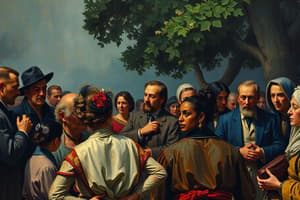Podcast
Questions and Answers
What are agents of socialization?
What are agents of socialization?
- Sports teams only
- Only families
- Institutions and individuals that provide structured situations (correct)
- Religious organizations only
The family is the primary agent of socialization in all societies.
The family is the primary agent of socialization in all societies.
True (A)
What does a child learn in the family as an agent of socialization?
What does a child learn in the family as an agent of socialization?
To think and speak, internalize norms and values, learn gender roles, develop intimate relationships, and build self-image.
What is the role of the family in socialization?
What is the role of the family in socialization?
What is deliberate socialization?
What is deliberate socialization?
What is the hidden curriculum in schools?
What is the hidden curriculum in schools?
How do peer groups influence socialization in adolescence?
How do peer groups influence socialization in adolescence?
What does the mass media serve as in socialization?
What does the mass media serve as in socialization?
What is re-socialization?
What is re-socialization?
What defines a total institution?
What defines a total institution?
What is social status?
What is social status?
What is role conflict?
What is role conflict?
What is emotional labor?
What is emotional labor?
Flashcards are hidden until you start studying
Study Notes
Agents of Socialization
- Socialization occurs through structured groups, institutions, and individuals, including families, schools, peers, media, sports, religion, advertising, labor force, law enforcement, state, and medical establishments.
- The impact of agents varies throughout an individual's lifespan.
The Family as the Primary Agent
- Families are the most significant socialization agents in all cultures.
- Children learn crucial skills such as thinking, speaking, internalizing values, gender roles, and self-image within the family context.
Role of the Family
- Families provide intimate face-to-face contact essential for early socialization.
- Parents are typically motivated to socialize their children effectively.
Socialization: Deliberate vs. Unintended
- Deliberate socialization involves intentional teachings (e.g., truth-telling).
- Unintended socialization can have a stronger impact through modeled behaviors (e.g., road rage affecting a child's perceptions of anger).
Schools as a Secondary Agent
- Schooling significantly occupies youth, approximately 30 weeks a year.
- Schools help reduce emotional dependency in children, aiding their adjustment to social norms.
The Hidden Curriculum
- Schools convey informal messages about social norms and expectations through interactions and curricula, emphasizing traits like punctuality and discipline.
- Known as a latent function of education, this curriculum shapes behaviors beyond academic learning.
The Peer Group
- Defined as a group of individuals of similar age and social characteristics, often formed by chance in childhood but chosen later in life.
- Peer groups provide experiences not available through family, facilitating self-exploration, while also enforcing conformity which can lead to stress.
Mass Media
- Mass media refers to communication tools like books, films, and the internet that reach large audiences without direct interaction.
- It shapes perceptions and values, encourages consumerism through advertising, and its influence is powerful though hard to quantify.
Television Influence
- Television is recognized as the strongest socializing medium, with 98% household ownership in the U.S. and significant viewing time.
Organized Sports as a Socializing Agent
- Organized sports socialize boys, fostering a competitive mentality and impacting perceptions of intimacy and self-worth.
Re-socialization
- This process involves replacing old norms with new ones during significant life transitions, such as starting a new job or getting married.
Total Institutions
- Total institutions isolate individuals from broader society and fully regulate their lives, such as prisons or military camps.
- These environments strip away previous identities to create new, institutionally approved ones.
Goffman's Theory of Total Institutions
- Goffman suggests that total institutions re-socialize individuals by controlling their environments, stripping identities, and subjecting them to degrading rituals, resulting in a transformation akin to death and rebirth.
Social Status
- Social status is a societal position accompanied by specific rights, duties, and expectations.
Types of Status
- Ascribed status is assigned at birth and is generally immutable.
- Achieved status results from personal efforts and achievements.
- Master status is a dominant position that overrides others, affecting all social interactions.
Social Roles
- Roles consist of expectations tied to a social status, reflecting associated norms and behaviors.
Socialization into Roles
- Role socialization occurs through agents such as family, schools, peers, and media, influencing roles related to gender, profession, and social status.
Role Conflict and Role Strain
- Role conflict arises when different statuses demand incompatible roles.
- Role strain occurs when multiple roles within a single status conflict.
Emotional Socialization
- Emotional socialization begins in infancy, influenced by cultural norms dictating appropriate emotional expressions.
Emotional Labor
- Emotional labor identifies the management of emotional displays relevant to professional roles, essential for impression management.
Hochschild's Contributions
- Arlie Hochschild's studies introduce concepts like emotional work, feeling rules, and emotional labor, emphasizing the significance of emotional management in various professions.
Emotion Work
- Emotion work involves the intentional management of feelings to present specific emotional displays, important in workplace interactions.
Feeling Rules
- Feeling rules are socially derived norms that dictate appropriate emotions for roles, often influenced by gender expectations.
Nature of Emotional Labor
- Emotional labor requires workers to regulate their emotional displays to elicit desired responses from others, often viewed as exploitative yet essential in many careers.
Studying That Suits You
Use AI to generate personalized quizzes and flashcards to suit your learning preferences.



